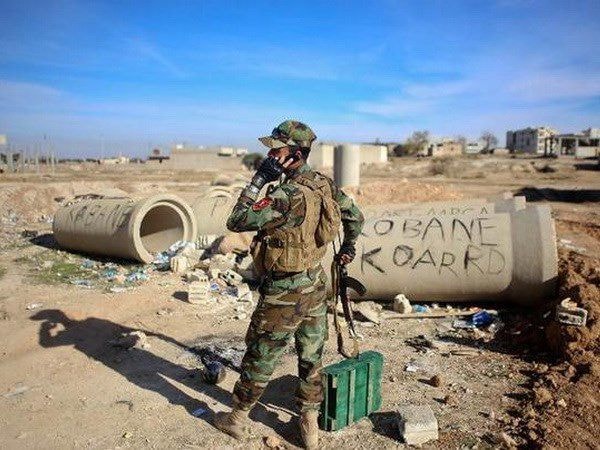The fight against IS is facing difficulties again due to overlapping enemies.
(Baonghean) - While the whole world is focusing on the fight against IS without any results, this war is facing the risk of being severely impacted. The reason comes from the hostile relationship between the two forces fighting against IS: the Turkish government and the Kurdish forces in the region.
Turkey's Kurdish concerns
Over the weekend, Kurdish militias successfully recaptured the entire strategic town of Kobane in northern Syria, bordering Turkey. According to international observers, Kurdish militias are currently trying to attack IS forces to protect the community in northern Syria, part of a plan to establish an autonomous region in this predominantly Kurdish area. The Kurds not only fight against extremists, but according to their leaders, each victory against IS contributes to the formation of an independent state. Notably, the instability in Iraq and Syria that led to the development of IS has forced the Kurds to arm themselves to fight against IS. And also from the fight against IS, the bond between the Kurds in Iraq and Syria has become tighter.
 |
| A Kurdish gunman. Source: AFP |
Although the US and the West may have known that the ultimate goal of the armed Kurds was to establish an independent Kurdish state to break away from Iraq, Iran, Syria and Türkiye. However, because the US did not want to send ground troops to Iraq to fight against IS, it supported the Kurdish fighters to grow stronger and then used them to fight against IS militants. Therefore, the Kurdish armed forces grew stronger thanks in part to Western patronage.
In the face of these developments, Turkish President Tayyip Erdogan affirmed over the weekend that his country would never allow an independent Kurdish state to border its borders. Turkish officials even bluntly stated that they could send troops into Syria to prevent this from happening. On June 28, Turkish Prime Minister Ahmet Davutoglu declared: "If the security of Turkey's borders is undermined or if we determine that this area is threatened, Türkiye is ready to deal with any situation. We have also done all the necessary work to be ready to deal with it." On June 29, Mr. Ahmet Davutoglu continued to affirm that the country was ready to deal with unexpected situations related to security issues along the territorial borders with Syria and Iraq. Meanwhile, according to Turkish media, although the army has not been deployed, the country has prepared all the necessary conditions for a ground campaign.
Dream of independence
In fact, the Kurds are classified as one of the largest ethnic groups in the world with about 25 million people, living in Syria, Türkiye, Iran, Iraq and the Kurdish community scattered in European countries. The land with the largest concentration of Kurds is called Kurdistan, which is located at the border of 4 countries Iraq, Iran, Syria and Türkiye. However, until now, because they have not had an independent state of their own, the Kurds have never given up this idea. In Iraq, the Kurds have a highly autonomous region in the North, and are even said to have opposed the Baghdad Government before 2003 when the US attacked Iraq. In Syria, the Kurds are also concentrated in the North and stay out of the conflict between the Government of President Bashar Al Assad and the opposition forces, but it is the instability of Syria that has caused the Kurds to arm themselves heavily, almost like a private army to protect their people. In Turkey, the Kurdistan Workers’ Party (PKK) has been conducting armed campaigns for more than three decades to drive Kurdish separatists from the Ankara government, killing thousands of people. Therefore, in Turkey, the hostility between the Kurds and the central government is even “deeper” than in Iraq and Syria. With important victories against IS militants in Syria and Iraq, there is no reason why the Kurds should not dream of their own independence.
The fight against IS is in trouble
Sharing a border with Syria, Türkiye is very concerned about the growth of Kurdish forces in Syria, like the Kurds in neighboring Iraq, because this could create a rear for Kurdish activities in Turkey. These developments show that the hostile triangle of Turkey - IS - Kurds is "heating up", threatening to turn the "fire pot" in this region into a strong fire.
In fact, the US and the West have always had a “headache” with these overlapping hostile relationships, leading to the fight against IS not achieving the desired results. If Türkiye decides to send ground troops into Syria to deal with both the Kurdish forces and IS, the fight against IS extremists in the region will change fundamentally. Turkey is an ally of the US, the country with the largest army and is currently the leading country in the international coalition against IS. However, this country is hostile to Kurdish fighters while Kurdish fighters are also the main infantry force facing IS. What the US and the West are worried about is gradually becoming apparent as overlapping conflicts are at risk of breaking out.
Both Turkey and the Kurds are fighting against IS, but Turkey is hostile to the Kurds. Therefore, it is entirely possible that another war will break out, which is a confrontation between the Turkish army and Kurdish fighters in both Turkish, Iraqi and Syrian territories if the Kurds establish their own state. This issue will naturally turn IS into a "fisherman who benefits", IS can take advantage of this situation to strengthen its forces. Therefore, if Turkey goes to war with the Kurdish fighters, not only will the region erupt into a new fire, but the war against IS may fall into a stalemate and drag on. And so, the civilians in this area will not be able to have a peaceful life on their land, and the humanitarian disaster will not end.
Nguyen Cao Bien
